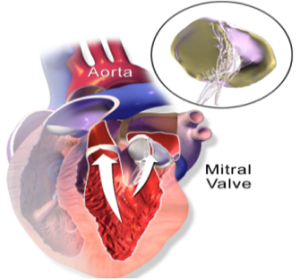Index
Congenital Anomalies of the Mitral Valve

What Is Congenital Anomalies of the Mitral Valve?
Congenital mitral valve anomalies are defects present at birth (congenital) that affect the heart's mitral valve.
The mitral valve is located between the heart's upper left chamber (left atrium) and lower left chamber (left ventricle).
What Causes Congenital Anomalies of the Mitral Valve?
Various types of mitral valve anomalies exist, including:
- Thickened, stiffened, deformed or fused valve flaps (leaflets). - Abnormalities with the cords that support the valve, such as short and thick cords, cords attaching to a heart muscle near the mitral valve, or missing cords.
- Heart tissue or heart muscle problems near the mitral valve.
- Thickened, stiffened, deformed or fused valve flaps (leaflets). - Abnormalities with the cords that support the valve, such as short and thick cords, cords attaching to a heart muscle near the mitral valve, or missing cords.
- Heart tissue or heart muscle problems near the mitral valve.

What are the Signs & Symptoms of Congenital Anomalies of the Mitral Valve?
Abnormal heart sound (heart murmur) heard through a stethoscope.
- Fatigue.
- Shortness of breath, particularly when you have been highly active or when you lie down.
- Irregular heartbeat.
- Fatigue.
- Shortness of breath, particularly when you have been highly active or when you lie down.
- Irregular heartbeat.
HEART CONDITIONS Diseases and Treated FAQ's
THE DIAGNOSIS CAN BE ASSISTED WHIT:
- Echocardiography This is the most important test. It shows the movement of blood through the valve.
- Transesophageal echocardiography This is a heart ultrasound done from the esophagus that can give better pictures of the aortic valve.
- Electrocardiogram This is done to check the heart’s electrical rhythm.
- Chest X-ray These help view the heart anatomy and lungs.
- Cardiac CT or MRI These are done if more detail is needed about the valve, heart, or aorta.
- Echocardiography This is the most important test. It shows the movement of blood through the valve.
- Transesophageal echocardiography This is a heart ultrasound done from the esophagus that can give better pictures of the aortic valve.
- Electrocardiogram This is done to check the heart’s electrical rhythm.
- Chest X-ray These help view the heart anatomy and lungs.
- Cardiac CT or MRI These are done if more detail is needed about the valve, heart, or aorta.
Depends on the severity of your condition and if you are experiencing symptoms. Doctors may monitor your condition with regular follow-up appointments.
You may eventually need surgery to treat your condition.
- Mitral valve repair.
Your doctor may often recommend mitral valve repair when possible, as it preserves your heart valve and may preserve heart function. Surgeons will generally perform mitral valve repair in children.
- Mitral valve replacement.
If the mitral valve cannot be repaired, surgeons may perform mitral valve replacement. In mitral valve replacement, your surgeon removes the damaged valve and replaces it with a mechanical valve or a valve made from cow, pig or human heart tissue (biological tissue valve).
- Mitral valve repair.
Your doctor may often recommend mitral valve repair when possible, as it preserves your heart valve and may preserve heart function. Surgeons will generally perform mitral valve repair in children.
- Mitral valve replacement.
If the mitral valve cannot be repaired, surgeons may perform mitral valve replacement. In mitral valve replacement, your surgeon removes the damaged valve and replaces it with a mechanical valve or a valve made from cow, pig or human heart tissue (biological tissue valve).